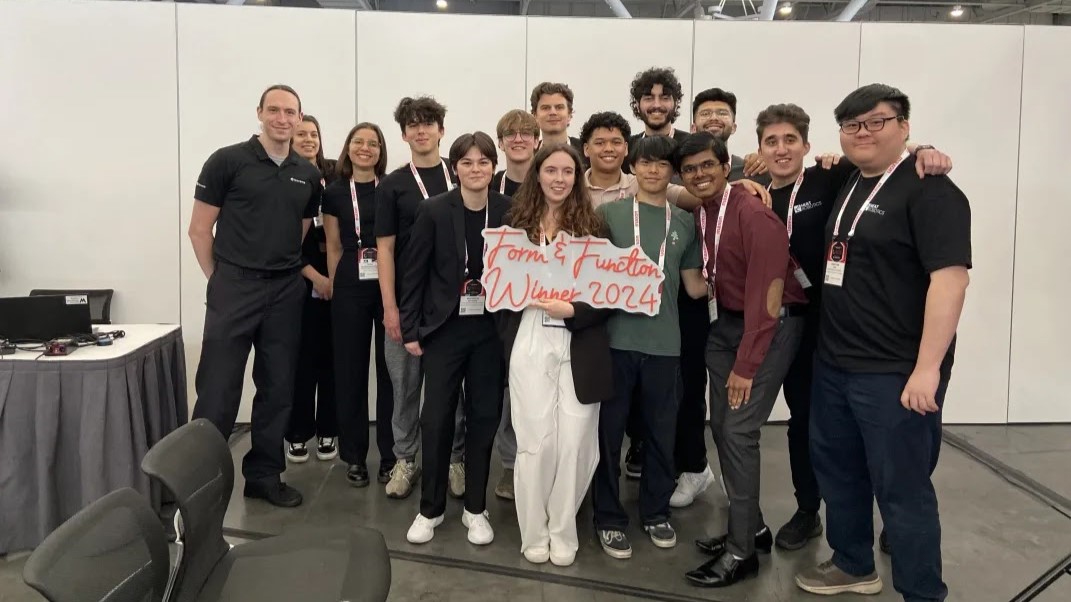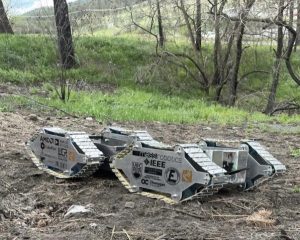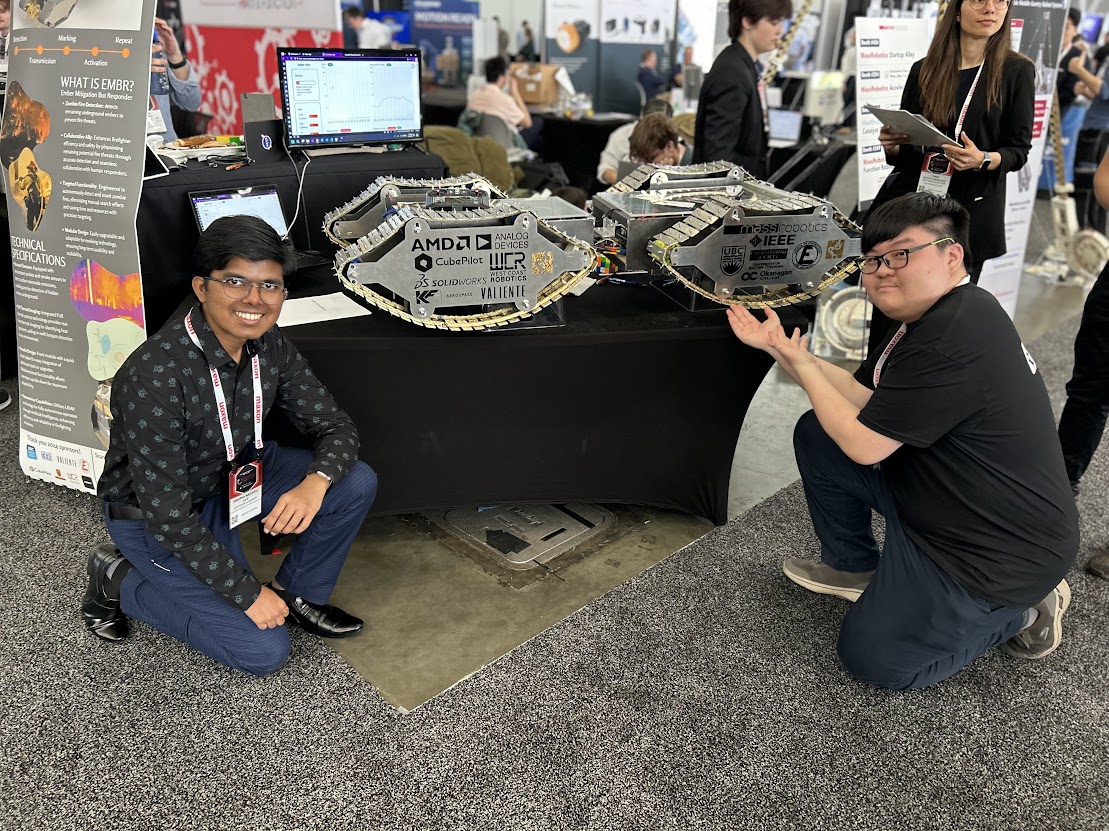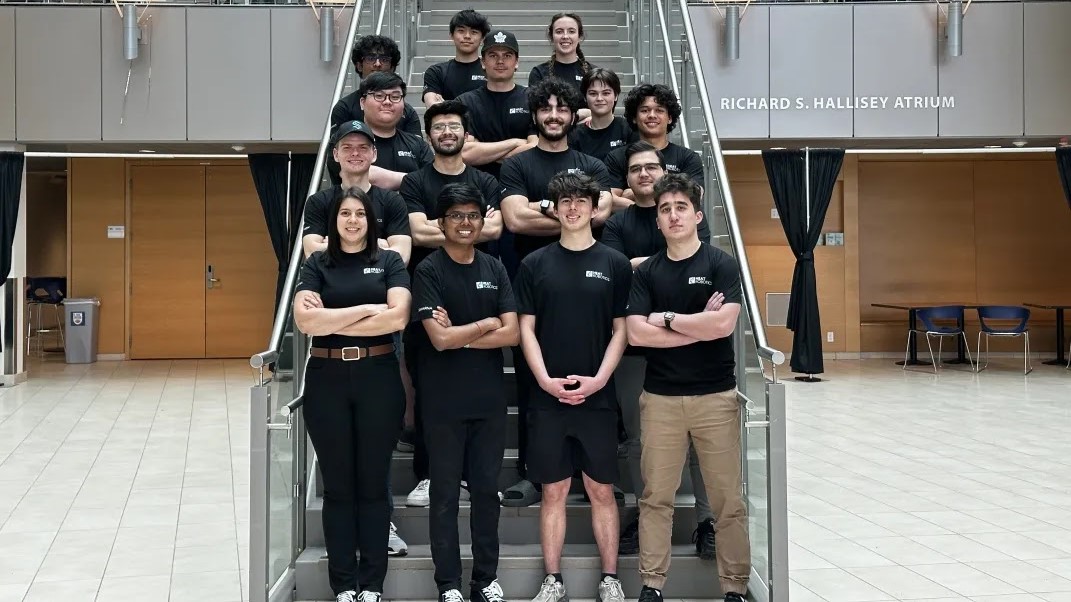
SoE Students’ ember mitigation bot won audience choice award at the MassRobotics Form & Function Robotics Challenge.
The following story expands upon a media release issued by UBCO Media Relations on May 29, 2024.
A team of engineering and science students from UBC Okanagan (UBCO) earned a top accolade at the MassRobotics Form & Function Robotics Challenge in Boston earlier this month. Now, their project, which uses an innovative robotic design to help map wildfire hotspots, could have an impact on the region, the province and beyond.
The MassRobotics competition brings together university teams from around the globe. Their challenge? Create a robotics or automation project with a cutting-edge form that accomplishes an important real-world challenge.
For the UBCO HEAT Robotics team, selecting which challenge their bot would tackle was simple.
“The recent wildfire season in British Columbia was marked as the most catastrophic in our recorded history,” noted the team.
“Our communities grappled with loss of life and the damage of hundreds of homes and structures. Particularly close was the McDougall Creek fire in West Kelowna, which rapidly spread to Kelowna where we live and go to school. Experiencing this devastation firsthand has not only deepened our understanding of the havoc wrought by wildfires but has also given us the desire to contribute meaningfully to wildfire management and prevention. This is what eventually led us to design EMBR.”
“We developed EMBR (Ember Mitigation Bot Responder) to combat the prominent issues that we face in B.C. surrounding wildfires,” said product lead Aziz Rakhimov. “After a fire has been put out, firefighters are forced to cover large areas checking for smoldering underground fires manually. EMBR is able to do this job, identifying and mapping the hotspots so that firefighters can allocate their resources more efficiently.”
The HEAT Robotics team is comprised of the following UBCO and Okanagan College students:
| NAME | ROLE | KEY | |
| Aziz Rakhimov | Founder, Product Lead | UBCO | |
| Jonathan Kiu Fung Chin | Co-Founder, Mechanical Engineer | Okanagan College* | |
| Julian Guda | Chief Finance Officer | ||
| Juliana Caetano Della Nina* | Chief Operations Officer | ||
| Michael Hierco* | Chief Marketing Officer | ||
| John Can Orhan | Filmmaker | ||
| Kelvin Lam | Technical Lead | ||
| Radu-Mihai David | Electrical Lead | ||
| Mathew Bishop | Electrical Engineer | ||
| Ethan Loewen | Manufacturing Lead | ||
| Sam Bachnak | Manufacturing Member | ||
| Aiden Ballantyne | Mechanical Lead | ||
| Charlotte Ford | Mechanical Engineer | ||
| Jose Pablo Alfonso | Mechanical Engineer | ||
| Omindu Etipola | Mechanical Engineer | ||
| MacKenzie Richards | Software Lead | ||
| Anson Ho | Software Developer | ||
| Ankkit Prakash | Software Developer | ||
| Elijah Chang | Software Developer | ||
| Leo Kaiya | Software Developer | ||
| Mahatav Arora | Software Developer | ||
| Swarna Nagaraj Kasi | Software Developer | ||
| Thais Damasceno* | Software Developer |
Making the audience accolade in Boston even more impressive was the fact that the team had limited time to prepare for the competition, all while juggling school, work and life outside university. Fifteen students traveled to the competition, while the project team numbered 25 in total.
“It’s remarkable what we’ve accomplished in under two months, balancing a full course load and other commitments. We are incredibly proud of every member of our team,” said team software lead MacKenzie Richards. “We overcame software challenges, mechanical challenges, all kinds of difficulties along the way. But we worked as a team and the result was incredibly rewarding.”
“There was amazing teamwork to build, refine and program the bot right up until the bot was shipped out and team members were leaving for Boston,” concurred team coordinator Jonathan Chin. “This project has been an amazing opportunity to put to work all we have learned in our respective classes and programs.”
The team cited specific courses such as APSC 171, an engineering Design and Computer Assisted Drawing (CAD), course as well as APSC 169, the Fundamentals of Sustainable Engineering Design, as being crucial to their efforts.
“Our first-year classes set us up for success in a huge way,” said Aziz. “We’ve taken the theory from class and have applied it in a very real-world way on a huge stage, and it’s opened up lots of doors for us.”
MassRobotics Form & Function Robotics Challenge is one of the world’s leading student robotics development events. Upon arriving in Boston, the team began to feel the audience support behind them and their idea immediately. In receiving the Audience Choice Award, they outperformed teams from MIT, Stanford, Tufts, Cornell, Carnegie, Harvard and many more.
The team was honored and grateful to have received the Audience Choice Award, notes Chin. “It was incredibly inspiring that people appreciated and gravitated to our story. We want to thank MassRobotics Boston for the opportunity to compete in the challenge alongside so many amazing schools. We definitely hope to participate again in the near future.”

The team would like to extend a huge thanks to the faculty and industry advisors who helped them reach this stage:
“We would not have been able to achieve this result without the help of UBC faculty. Thank you to Dr. Rudi Seethaler, Dr. Roland Stull, Dr. Jonathan Holzman, Dr. Mehran Shirazi, Dr. Ray Taheri, Dr. Yves Lucet, Dr. Sylvie Desjardins and PhD Christopher Rodell for your continuous support and advice!” said the team in a statement. “We would also like to thank Jordan Ziegler and Todd Ford for their external manufacturing help on the bot, along with Wing-Shun Lam and Jacqueline Desjardins for their tremendous help in providing transportation and logistical support!”
The team would also like to acknowledge its sponsors, whose support was crucial for EMBR’s success: the UBCO School of Engineering, UBCO Faculty of Science, AMD, Analog Devices, CubePilot, The Engineering Society at the University of British Columbia, West Coast Robotics Ltd., SOLIDWORKS, KF Aerospace, and Okanagan College.

“Congratulations to the EMBR team on this impressive result and on their continued dedication, hard work and innovative efforts to address this important issue. We know wildfire response and resilience is a topic of deep importance to our region—and to the world—in the face of a changing environment. This project is an example of the many ways in which UBC can support and advance these efforts through our research, learning and teaching,” said Dr. Will Hughes, Director of the School of Engineering at UBCO.
The success in Boston is just the beginning for the EMBR project.
The team plans to continue to refine their design and will be working to attain additional funding for the projects through government grants and industry partnerships.
“For immediate suppression, EMBR may utilize an onboard water system or alternative methods, such as smothering embers with cool soil, mirroring traditional firefighting techniques. We will also be researching other features and implementations such as topographical data analysis and using swarm robotics to have multiple rovers working together to cover more ground.”
“But we will not be able to continue the project and bring it to a wider audience without more funding, more sponsors and industry partners. So that is where our energy will go for the immediate future – to secure that support,” said Rakhimov.
Learn more about EMBR or contact the team for sponsorship and partnership opportunities.